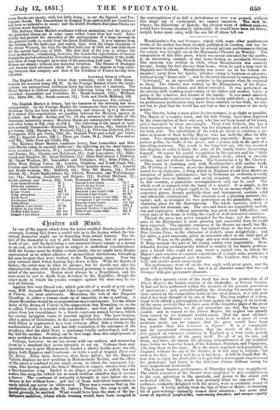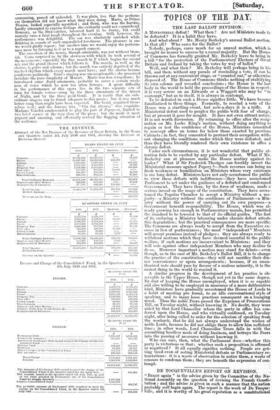The other operatic event of the week has been the
production of II Rant° Magic° the Italian version of the Zauborfkiie, at Covent Garden. It had not been performed within the memory of the present generation of opera-goers ; and, notwithstanding the straining for novelty and va- riety caused by the competition between two rival houses, it is only now that it has been thought of by one of them. The long neglect of a thea- trical work affords a presumption at least against the policy of its revival. Of the many revivals that we.have seen of the forgotten playasof the great Elizabethan dramatists, we do not remember one that has been suc- cessful: and in regard to the Flauto Nagle°, the neglect has plainly been caused by its dramatic worthlessness. Had the most enchant- ing music that Mozart over wrote been wedded to a piece of even moderate merit, can we suppose that the piece would have been less popular than Don Giovanni or Figaro? It is a remarkable and an exceptional circumstance, that the music of the Zanber- fide gained an extensive currency in England at a very early period, quite independently of the opera itself. To all of us, its airs, and duets, and trios, are among the pleasing remembrances of our youthful days, before we had ever heard of the Taminos, Parninas, and Papagenas, who sing them on the stage. How the music acquired such popularity in England without the aid of the theatre, it is not easy to explain ; but such is the fact. And it will be as it bas been : it will be found that the true way to enjoy the ZaubevlOte is to get half a dozen good singers round the pianoforte, and listen to the delicious strains without caring for their insignificant framework. The Covent Garden performance of Thursday night was magnificent. The whole resources of the theatre were employed to give completeness to the cast, splendour to the spectacle, and power to the choral and orchestral effects. The result was precisely what we expected. The audience, evidently delighted with the music, were as evidently weary of the opera. A lovely melody from the lips of Grisi or Mario—a charming bit of part-writing—instantly roused their attention;, but scene after scene of mystical perplexities, unmeaning disasters, and eacepes equally unmeaning, passed off unheeded. It was plain, too, that the perform- ers themsPlves did not know what they were doing. Mario, as Prince Tamino, looked especially mystified ; and Grisi, who was the heroine, hardly attempted to express feelings she evidently could not comprehend. Ronconi, as the Bird-catcher, laboured hard to be funny, but could scarcely raise a faint laugh throughout the evening. Still, however, the performance was delightful. The car was absolutely enriched while drinking in sounds of such unparalleled loveliness. The pleasure is one we would gladly repeat ; but another time we would enjoy the perform- ance more by listening to it as to a superb concert. The execution of the music, though admirable, was not without blem- ish. Costa surprised us by the slowness with which he took several of the movements ; especially the fine march in F which begins the second act, and the grand chorus which follows it. The march, as well as the chorus, is grave and solemn ; but the march was entirely deprived of the marked rhythm which every march must have; and the chorus became ponderous psalmody. Grisi's singing was unexceptionable ; she preserved inviolate the pure simplicity of Mozart. Mario was less scrupulous; he introduced some florid ornaments, probably to cover a certain weak- ness of voice which he now too often betrays. A great difficulty in the performance of this opera lies in the two separate sets of trios for female voices-sung by the three attendants of the Queen of Night, and by the three good Genii. It is rarely that six sub- ordinate singers can be found adequate to this music ; but it was much better sung than might have been expected. The Genii acquitted them- selves well ; and the famous trio, " Gia fan ritorno," was exquisite. Madame Viardot condescended to play the part of rapagena, limited to two brief scenes at the very close of the piece; but she made it most piquant and amusing, and effectually revived the flagging attention of the audience.



























 Previous page
Previous page